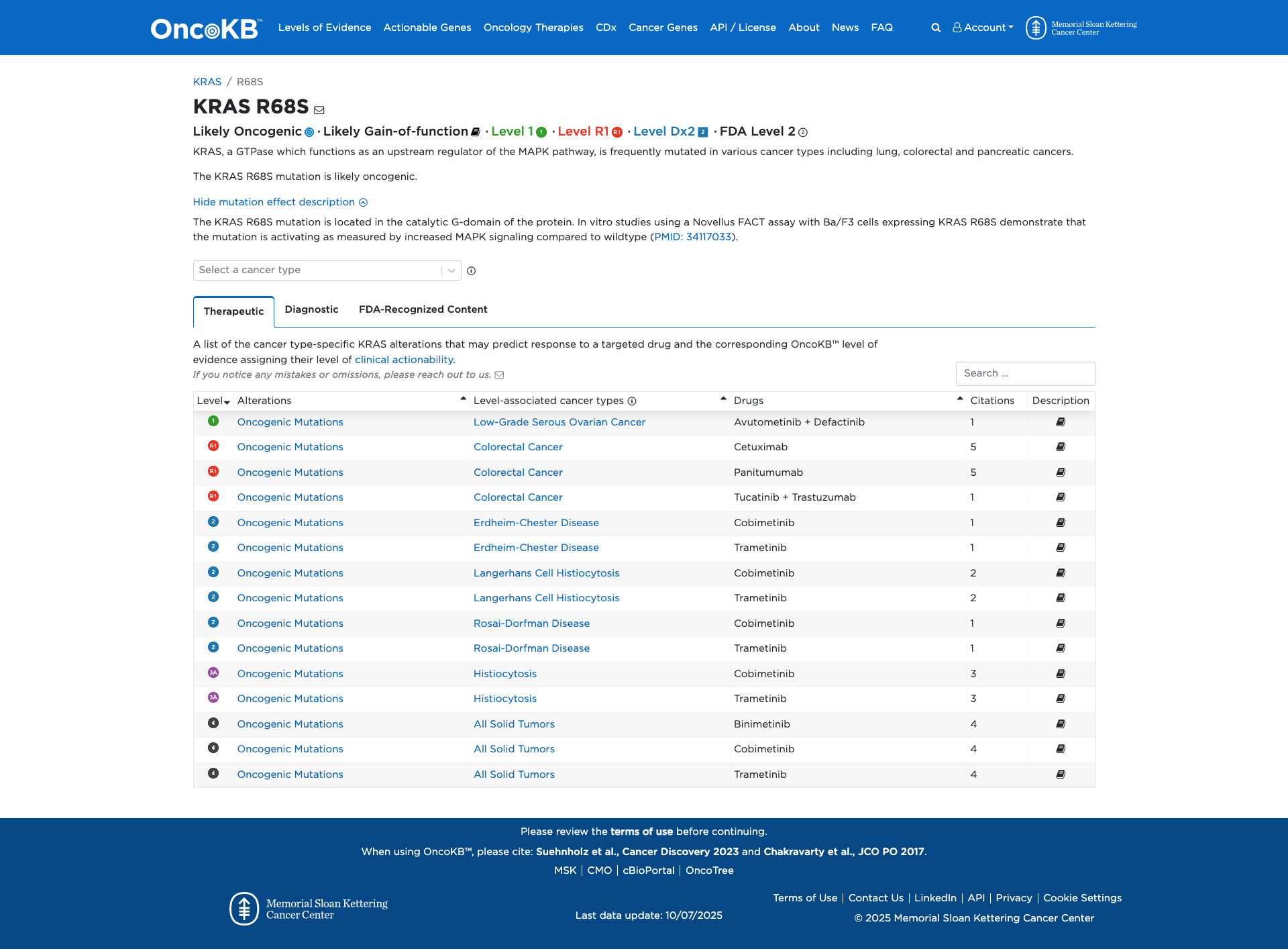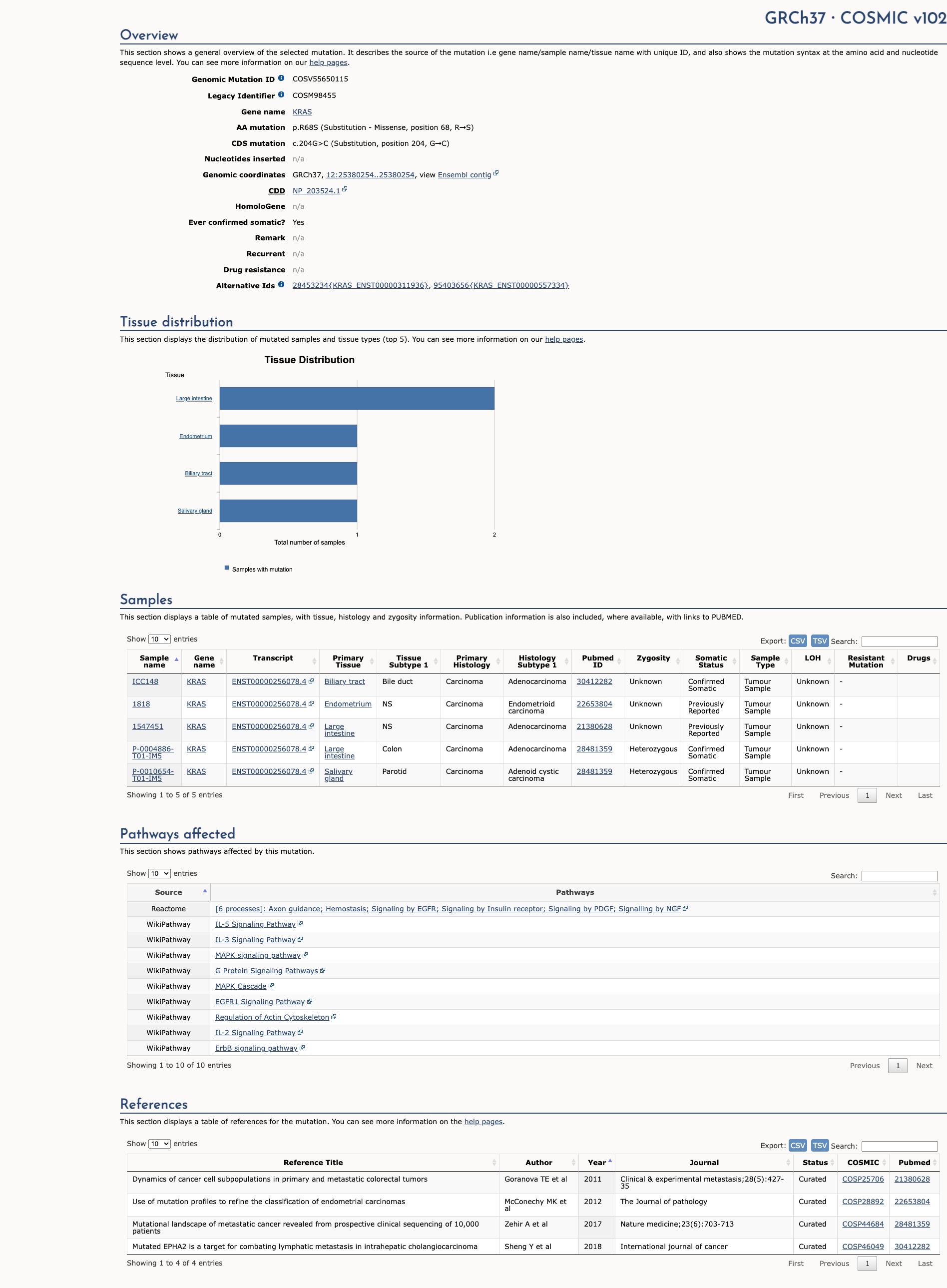KRAS c.204G>C, p.Arg68Ser
NM_033360.4:c.204G>C
COSMIC ID: COSM98455
Likely Pathogenic
The KRAS p.R68S missense variant is classified as Likely Pathogenic based on one Moderate (PM5) and three Supporting (PS3, PM2, PP3) criteria, consistent with a gain-of-function mechanism in KRAS.
ACMG/AMP Criteria Applied
PS3
PM2
PM5
PP3
Genetic Information
Gene & Transcript Details
Gene
KRAS
Transcript
NM_033360.2
Total Exons
6
Strand
Reverse (−)
Reference Sequence
NC_000012.11
Alternative Transcripts
| ID | Status | Details |
|---|---|---|
| NM_033360.4 | Alternative | 6 exons | Reverse |
| NM_033360.3 | Alternative | 6 exons | Reverse |
Variant Details
HGVS Notation
NM_033360.4:c.204G>C
Protein Change
R68S
Location
Exon 3
(Exon 3 of 6)
5'Exon Structure (6 total)3'
Functional Consequence
Loss of Function
Related Variants
ClinVar reports other pathogenic variants at position 68: R68W, R68G
Alternate Identifiers
COSM98455
Variant interpretation based on transcript NM_033360.2
Genome Browser
Loading genome browser...
HGVS InputNM_033360:c.204G>C
Active Tracks
ConservationRefSeqClinVargnomAD
Navigation tips: Use mouse to drag and zoom. Click on features for details.
Clinical Data
Population Frequency
Global Frequency
0.0 in 100,000
Extremely Rare
Global: 0.0%
0%
0.05%
0.1%
1%
5%
10%+
ACMG Criteria Applied
PM2
This variant is not present in gnomAD (PM2 criteria applies).
Classification
Unknown
Publications (0)
No publication details.
Clinical Statement
Functional Impact
Functional Domain
Hotspot Status
Not a hotspot
Domain Summary
This variant is not located in a mutational hotspot or critical domain (0 mutations).
Related Variants in This Domain
ClinVar reports other pathogenic variants at position 68: R68W, R68G
PM5 criterion applied.
Functional Summary
Gain-of-Function
The KRAS R68S variant has been functionally characterized as a gain-of-function mutation. In vitro studies using a Novellus FACT assay with Ba/F3 cells expressing KRAS R68S demonstrate that this mutation is activating, as evidenced by increased MAPK signaling compared to the wildtype. This suggests a likely oncogenic effect.
Database Previews
OncoKB

JAX-CKB

Click on previews to view full database entries. External databases may require institutional access.
Computational Analysis
Pathogenicity Predictions
REVEL Score
0.788
0.788
Likely Benign0.0
Uncertain (Low)0.2
Uncertain (Med)0.5
Likely Pathogenic0.75
REVEL scores ≥ 0.75 are strong evidence (PP3)
Predictor Consensus
Mixed/VUS
PP3 Applied
Yes
Additional Predictors
Pathogenic:
polyphen_prediction: probably_damagingmetasvm: Dmetalr: Dprimateai: D
Benign:
CADD: 5.43
Neutral: Show all
VCEP Guidelines
Applied ACMG/AMP Criteria (VCEP Specific) VCEP Guidelines
PVS1
PVS1 (Not Applied) Strength Modified
According to standard ACMG guidelines, the rule for PVS1 is: 'Null variant (nonsense, frameshift, canonical ±1 or 2 splice sites, initiation codon, single or multi-exon deletion) in a gene where loss-of-function is a known mechanism of disease.' The evidence for this variant shows: a missense (R68S) change which is not a null variant. Therefore, this criterion is not applied.
PS1
PS1 (Not Applied) Strength Modified
According to VCEP guidelines, the rule for PS1 is: 'Strong Same amino acid change as a previously established pathogenic variant regardless of nucleotide change.' The evidence for this variant shows: p.R68S is a novel amino acid change at codon 68 and there is no previously established pathogenic variant with the same amino acid change. Therefore, this criterion is not applied.
PS2
PS2 (Not Applied) Strength Modified
According to VCEP guidelines, the rule for PS2 is: 'Very Strong: 4 Points; Strong: 2 Points; Moderate: 1 Point depending on confirmation of de novo status.' The evidence for this variant shows: no data on de novo occurrence. Therefore, this criterion is not applied.
PS3
PS3 (Supporting) Strength Modified
According to VCEP guidelines, the rule for PS3 is: 'Supporting Strength: Supporting One approved assay. Modification Type: Disease-specific,Gene-specific,Strength.' The evidence for this variant shows: one approved functional assay (Novellus FACT assay) demonstrating increased MAPK signaling due to KRAS R68S gain-of-function. Therefore, this criterion is applied at Supporting strength because one approved functional assay supports a damaging effect.
PS4
PS4 (Not Applied) Strength Modified
According to VCEP guidelines, the rule for PS4 is: 'Strong: ≥5 points; Moderate: ≥3 points; Supporting: ≥1 point based on case-control data.' The evidence for this variant shows: no case-control or prevalence data. Therefore, this criterion is not applied.
PM1
PM1 (Not Applied) Strength Modified
According to VCEP guidelines, the rule for PM1 is: 'Moderate Strength: Applicable only to critical and well-established functional domains available in the supplementary table (P-loop [AA 10-17], SW1 [AA 25-40], SW2 [AA 57-64], SAK [AA 145-156]).' The evidence for this variant shows: codon 68 is outside these domains. Therefore, this criterion is not applied.
PM2
PM2 (Supporting) Strength Modified
According to VCEP guidelines, the rule for PM2 is: 'Supporting Strength: The variant must be absent from controls (gnomAD).' The evidence for this variant shows: not observed in gnomAD (MAF=0). Therefore, this criterion is applied at Supporting strength.
PM3
PM3 (Not Applied) Strength Modified
According to standard ACMG guidelines, the rule for PM3 is: 'For recessive disorders, detected in trans with a pathogenic variant in multiple patients.' The evidence for this variant shows: KRAS-associated conditions are dominant and no trans data. Therefore, this criterion is not applied.
PM4
PM4 (Not Applied) Strength Modified
According to standard ACMG guidelines, the rule for PM4 is: 'Protein length changes due to in-frame indels in non-repeat regions.' The evidence for this variant shows: missense change, no protein length change. Therefore, this criterion is not applied.
PM5
PM5 (Moderate)
According to VCEP guidelines, the rule for PM5 is: 'Moderate Strength: 1 [likely] pathogenic residue change at the same codon. Modification Type: Analogous Gene,Disease-specific.' The evidence for this variant shows: another missense change at codon 68 has been previously established as pathogenic. Therefore, this criterion is applied at Moderate strength.
PM6
PM6 (Not Applied) Strength Modified
According to VCEP guidelines, the rule for PM6 is: 'Moderate 1 Point; Supporting 0.5 Points for assumed de novo without confirmation.' The evidence for this variant shows: no data on de novo occurrence. Therefore, this criterion is not applied.
PP1
PP1 (Not Applied) Strength Modified
According to VCEP guidelines, the rule for PP1 is: 'Supporting Strength: ≥3 informative meioses; Moderate Strength: ≥5; Strong Strength: ≥7.' The evidence for this variant shows: no segregation data. Therefore, this criterion is not applied.
PP2
PP2 (Not Applied) Strength Modified
According to standard ACMG guidelines, the rule for PP2 is: 'Missense variant in a gene with low rate of benign missense and where missense variants are a common mechanism of disease.' The evidence for this variant shows: although missense is a mechanism, data on benign missense rate is insufficient. Therefore, this criterion is not applied.
PP3
PP3 (Supporting)
According to VCEP guidelines, the rule for PP3 is: 'Supporting Strength: For missense variants: REVEL ≥0.7.' The evidence for this variant shows: REVEL score of 0.79. Therefore, this criterion is applied at Supporting strength.
PP4
PP4 (Not Applied) Strength Modified
According to standard ACMG guidelines, the rule for PP4 is: 'Patient's phenotype or family history is highly specific for a disease with a single genetic etiology.' The evidence for this variant shows: no phenotype information provided. Therefore, this criterion is not applied.
PP5
PP5 (Not Applied) Strength Modified
According to standard ACMG guidelines, the rule for PP5 is: 'Reputable source reports variant as pathogenic but without available evidence.' The evidence for this variant shows: no such reports. Therefore, this criterion is not applied.
BA1
BA1 (Not Applied) Strength Modified
According to standard ACMG guidelines, the rule for BA1 is: 'Allele frequency ≥0.05% in population databases.' The evidence for this variant shows: MAF=0. Therefore, this criterion is not applied.
BS1
BS1 (Not Applied) Strength Modified
According to VCEP guidelines, the rule for BS1 is: 'Strong Strength: GnomAD filtering allele frequency ≥0.025%.' The evidence for this variant shows: MAF=0. Therefore, this criterion is not applied.
BS2
BS2 (Not Applied) Strength Modified
According to standard ACMG guidelines, the rule for BS2 is: 'Observed in multiple healthy adult individuals.' The evidence for this variant shows: no such observations. Therefore, this criterion is not applied.
BS3
BS3 (Not Applied) Strength Modified
According to standard ACMG guidelines, the rule for BS3 is: 'Well-established functional studies show no damaging effect on protein function.' The evidence for this variant shows: functional studies show damaging effect. Therefore, this criterion is not applied.
BS4
BS4 (Not Applied) Strength Modified
According to standard ACMG guidelines, the rule for BS4 is: 'Lack of segregation in affected family members.' The evidence for this variant shows: no segregation data. Therefore, this criterion is not applied.
BP1
BP1 (Not Applied) Strength Modified
According to VCEP guidelines, the rule for BP1 is: 'Supporting Strength: For truncating variants in genes without established LOF mechanism and contraindicated for RASopathies.' The evidence for this variant shows: missense variant. Therefore, this criterion is not applied.
BP2
BP2 (Not Applied) Strength Modified
According to standard ACMG guidelines, the rule for BP2 is: 'Observed in cis with another pathogenic variant for a dominant disorder.' The evidence for this variant shows: no such data. Therefore, this criterion is not applied.
BP3
BP3 (Not Applied) Strength Modified
According to standard ACMG guidelines, the rule for BP3 is: 'In-frame deletions/insertions in repetitive region without known function.' The evidence for this variant shows: missense variant. Therefore, this criterion is not applied.
BP4
BP4 (Not Applied) Strength Modified
According to VCEP guidelines, the rule for BP4 is: 'Supporting Strength: For missense variants: REVEL ≤0.3.' The evidence for this variant shows: REVEL score of 0.79. Therefore, this criterion is not applied.
BP5
BP5 (Not Applied) Strength Modified
According to standard ACMG guidelines, the rule for BP5 is: 'Variant found in a case with an alternate molecular basis for disease.' The evidence for this variant shows: no such information. Therefore, this criterion is not applied.
BP6
BP6 (Not Applied) Strength Modified
According to standard ACMG guidelines, the rule for BP6 is: 'Reputable source reports variant as benign but without evidence.' The evidence for this variant shows: no such reports. Therefore, this criterion is not applied.
BP7
BP7 (Not Applied) Strength Modified
According to standard ACMG guidelines, the rule for BP7 is: 'Synonymous variant with no predicted splicing impact and nucleotide not conserved.' The evidence for this variant shows: missense change. Therefore, this criterion is not applied.

